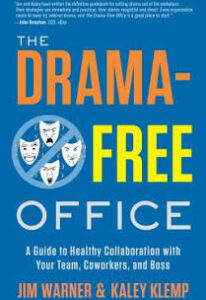We’ve all seen it at work, at church, in families, or in other groups. Conflict, gossip, territoriality, defensiveness, and withdrawal. Patterns of dysfunctionality like these persist often because we just don’t have the skills to deal with them or we are afraid that confrontation will just make it worse.
 The Drama-Free Office considers four common patterns of behavior that can drag teamwork down and keep the organization from reaching its goals. Maybe you’ll recognize the Complainer (blaming others for their own problems), the Cynic (sniping about everyone else’s problems), the Controller (steamrolling and micromanaging), the Caretaker (overcommitting and rescuing).
The Drama-Free Office considers four common patterns of behavior that can drag teamwork down and keep the organization from reaching its goals. Maybe you’ll recognize the Complainer (blaming others for their own problems), the Cynic (sniping about everyone else’s problems), the Controller (steamrolling and micromanaging), the Caretaker (overcommitting and rescuing).
As I read, I could think of multiple examples of all these types during my career. Then it dawned on me I could see examples of how at one time or another I have played all four roles as well. The authors therefore emphasize how we can get out of our own drama and into a more open, curious, and constructive posture. Interestingly, it struck me that the specific antidotes suggested for each drama type could be seen as virtual spiritual disciplines.
The book also offers clear, concrete suggestions for working with colleagues, subordinates, and even bosses who exhibit these patterns. We can’t bulldoze our way in these matters. The point is not confrontation but proceeding positively, affirming, and expressing gratitude wherever possible. With our own drama in check and with a goal of reaching concrete agreements, the door is opened to collaboration.
